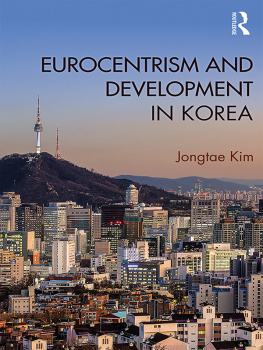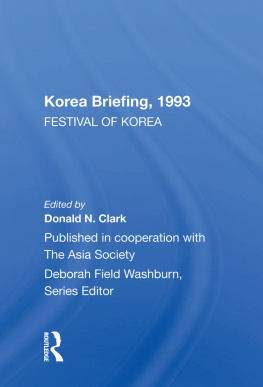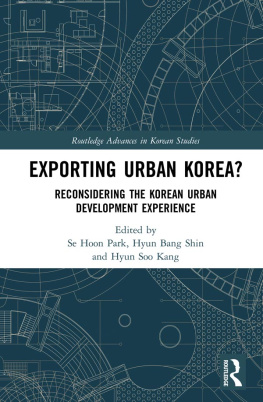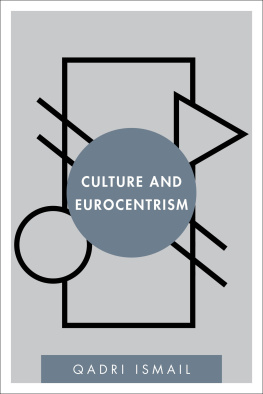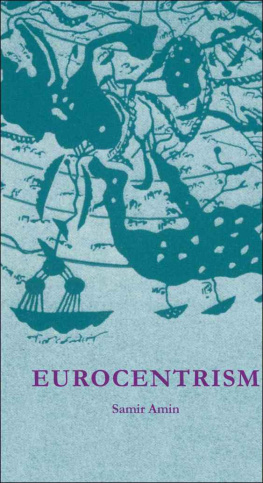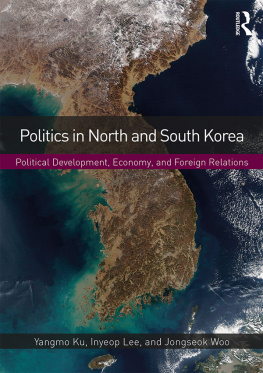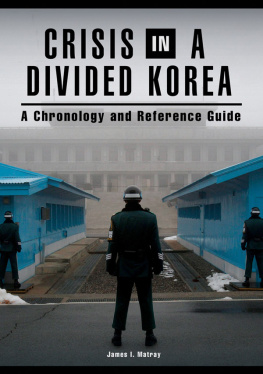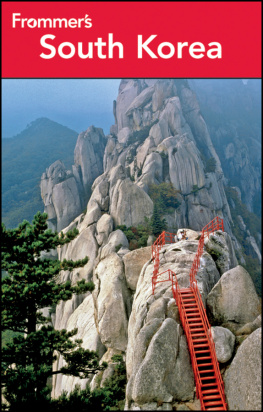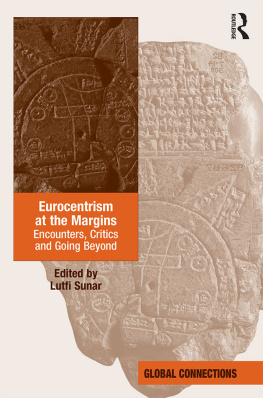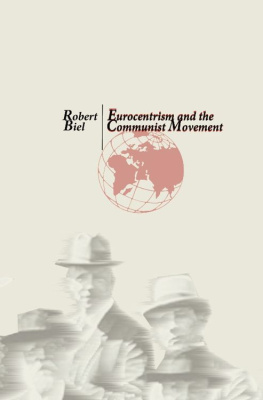Eurocentrism and Development in Korea
Under the global hegemony of the West, societies have interpreted the world and defined their identities through the frameworks of Eurocentric discourses. Since the mid-twentieth century, Eurocentrism has tended to be associated with economic developmentalism. The discourse of seonjinguk (developed country) has been a dominant Eurocentric developmental discourse in Korea.
However, in what historical contexts have the Koreans set seonjinguk as their national goal and yardstick to judge nations? What roles have been played by the concept of seonjinguk in Korea? What discursive frameworks did the Koreans use for their national identities and worldviews before the developmental era? Eurocentrism and Development in Korea is the first scholarly approach to those questions. Through a chronological analysis of Koreas dominant discourses from the late nineteenth century to the present, Kim demonstrates the historical nature of developmentalism and seonjinguk discourse for Koreas developmental era, and traces their genealogy to gaehwa (enlightenment) and munmyeong (civilization) discourses from a sociologicalhistorical perspective.
Providing essential knowledge about Koreas history of Eurocentrism, developmentalism and national change, this enlightening monograph will appeal to undergraduate and postgraduate students, as well as postdoctoral researchers, interested in fields such as Korean Studies, Development Studies and Global Sociology.
Jongtae Kim is Humanities Korea (HK) Research Professor in the Asiatic Research Institute at Korea University, Seoul, Korea.
Routledge Studies in Emerging Societies
Series editor: Jan Nederveen Pieterse, University of California, Santa Barbara
The baton of driving the world economy is passing to emerging economies. This is not just an economic change, but a social change, with migration flows changing direction towards surplus economies; a political change, as in the shift from the G7 to G20; and over time, cultural changes. This also means that the problems of emerging societies will increasingly become world problems. This series addresses the growing importance of BRIC (Brazil Russia India China) and rising societies such as South Korea, Taiwan, Singapore, Indonesia, South Africa, Turkey, the UAE and Mexico. It focuses on problems generated by emergence, such as social inequality, cultural change, media, ethnic and religious strife, ecological constraints, relations with advanced and developing societies, and new regionalism, with a particular interest in addressing debates and social reflexivity in emerging societies.
1 Global Modernity, Development, and Contemporary Civilization
Towards a Renewal of Critical Theory
Jos Maurcio Domingues
2 Globalization and Development in East Asia
Edited by Jan Nederveen Pieterse and Jongtae Kim
3 Brazil Emerging
Inequality and Emancipation
Edited by Jan Nederveen Pieterse and Adalberto Cardoso
4 Higher Education in the Global Age
Policy, Practice and Promise in Emerging Societies
Edited by Daniel Araya and Peter Marber
5 Critical Theory After the Rise of the Global South
Kaleidoscopic Dialectic
Boike Rehbein
6 Changing Constellations of Southeast Asia
From Northeast Asia to China
Edited by Jan Nederveen Pieterse, Abdul Rahman Embong, Siew Yean Tham
7 Eurocentrism and Development in Korea
Jongtae Kim
Eurocentrism and Development in Korea
Jongtae Kim
First published 2018
by Routledge
2 Park Square, Milton Park, Abingdon, Oxon OX14 4RN
and by Routledge
711 Third Avenue, New York, NY 10017
Routledge is an imprint of the Taylor & Francis Group, an informa business
2018 Jongtae Kim
The right of Jongtae Kim to be identified as author of this work has been asserted by him in accordance with sections 77 and 78 of the Copyright, Designs and Patents Act 1988.
All rights reserved. No part of this book may be reprinted or reproduced or utilised in any form or by any electronic, mechanical, or other means, now known or hereafter invented, including photocopying and recording, or in any information storage or retrieval system, without permission in writing from the publishers.
Trademark notice: Product or corporate names may be trademarks or registered trademarks, and are used only for identification and explanation without intent to infringe.
British Library Cataloguing-in-Publication Data
A catalogue record for this book is available from the British Library
Library of Congress Cataloging-in-Publication Data
Names: Kim, Jongtae, author.
Title: Eurocentrism and development in Korea / Jongtae Kim.
Description: 1 Edition. | New York, NY : Routledge, 2017. | Series: Routledge studies in emerging societies | Includes bibliographical references and index.
Identifiers: LCCN 2017050643 | ISBN 9781138234079 (hardback)
Subjects: LCSH: Korea (South)--Economic policy. | Economic development--Korea (South)
Classification: LCC HC467 .K 2017 | DDC 338.95195--dc23
LC record available at https://lccn.loc.gov/2017050643
ISBN: 978-1-138-23407-9 (hbk)
ISBN: 978-1-315-30807-4 (ebk)
I take a walk around the Han River Park in free evening time. Beneath the lonely high shining Seoul Tower is the calmly flowing Han River reflecting various colors of city lights. Lazily watching people cycling, dating, or playing with pets, I sometimes wonder if this is seonjinguk (an advanced country). In fact, not many metropolitan cities in the world, with sizes comparable to Seoul, have popular spaces like the Han River Park where people can enjoy their leisure time late into the night. Nonetheless, in many Seoulites minds is a vague yearning for New Yorks Central Park, which turns into a dangerous zone at night.
A Korean visitor to the University of Illinois, whom I met in my doctoral years, came to the U.S. to study the U.S. subprime mortgage system. Shortly after his return to Korea, the U.S. underwent a severe financial crisis because of the subprime mortgage. This incident reflects a reality of Korean society that any kind of financial institution in the U.S. can be a research topic for Korea as an advanced case. In fact, is it not that Korean society has lost much of its critical and independent thinking ability in regard to the U.S. and the West, while settling under U.S. hegemony amidst the extreme intra-national conflict with North Korea?
Studying in the U.S., I could not help but sometimes question if the U.S. was really a more desirable country than Korea, given that the U.S. had lots of its own domestic and international problems which it lacked the wisdom to solve for itself. In fact, there is a big difference between the reality of the U.S. and the U.S. in Koreans imagination. Why is this? Why do the Koreans aspire to the U.S. and the West with a deficient self-identity? What justifies the epistemic hierarchy between Korea and the West?
To answer these questions, I try to find answers in the discourse of seonjinguk. Within this discursive framework, Koreans idealize the West while marginalizing the non-West including themselves. Insofar as the U.S. is


